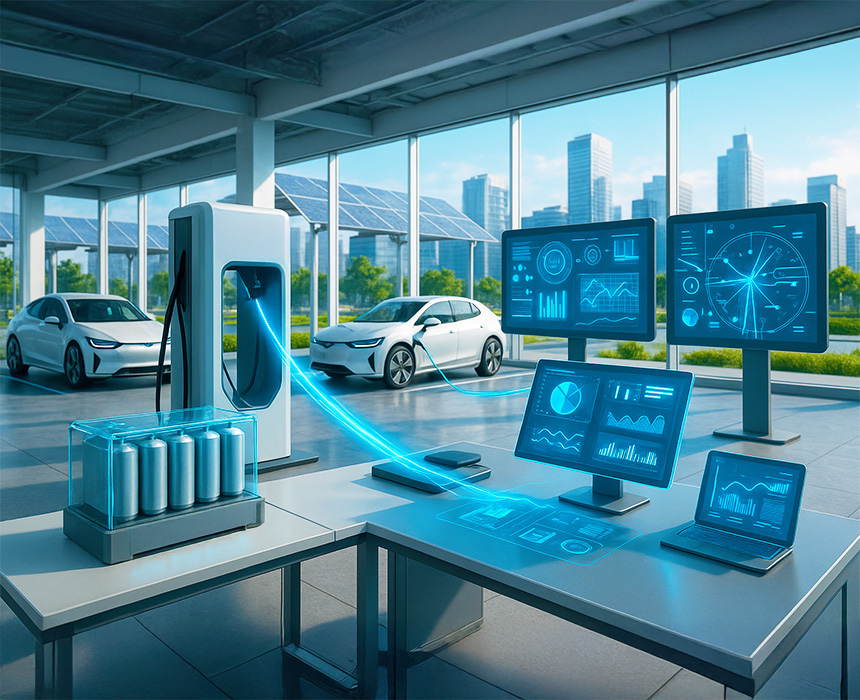Battery, Software, and Next-Generation Charging Solutions in EV Technologies
Over the past decade, the electric vehicle (EV) industry has undergone one of the most significant transformations in the history of the automotive sector. At the center of this transformation lie technological developments: battery technologies, software integrations, ultra-fast charging solutions, and smart mobility applications. These innovations are not only reshaping vehicle performance but are also influencing the way cities of the future will function.
Breakthroughs in Battery Technologies
The heart of every EV is its battery. Today’s lithium-ion batteries have advanced considerably in terms of energy density and cost optimization. However, the future belongs to solid-state batteries. With their potential for higher energy density, faster charging times, and much longer life cycles, solid-state batteries promise to revolutionize the industry.
As these technologies become mainstream, range anxiety will diminish, making EVs more competitive with traditional internal combustion engine vehicles in everyday use.
Software and Smart Integration
Modern EVs are not defined by hardware alone; what truly differentiates them is software. Everything from energy consumption and driving behavior to route optimization and battery life monitoring is governed by sophisticated software systems.
Smart communication protocols between EVs and charging stations provide users with a seamless and efficient charging experience. Cloud-based platforms, real-time updates, and AI-powered predictive systems simplify operations for both users and operators.
Ultra-Fast Charging Solutions
Today’s fast charging solutions allow up to 80% charge within 30 minutes. In the near future, ultra-fast charging systems will enable full charges in as little as 5–10 minutes, eliminating one of the key disadvantages of EVs during long trips.
The deployment of such systems, however, requires strengthening grid infrastructure. High-capacity transformers, advanced energy management systems, and renewable energy integration will all be essential components of this evolution.
Connected Vehicles and the Internet of Things (IoT)
EVs are integral to the vision of smart cities. IoT-based technologies enable vehicles to communicate with each other, with traffic lights, with charging infrastructure, and with urban systems.
This interconnectivity optimizes traffic flow, enhances energy efficiency, and provides safer, smarter mobility. For example, vehicles can avoid charging simultaneously during peak hours, reducing stress on the grid.
Artificial Intelligence and Predictive Analytics
AI is playing an increasingly central role in EV technologies. AI systems can monitor battery health, predict potential failures, and recommend the most efficient charging points based on driver behavior.
Predictive analytics also allows manufacturers to forecast regional demand more accurately, enabling better production and distribution planning across markets.
Regulations and Standards
Rapid technological development requires continuously updated standards. Institutions such as EPDK, TSE in Türkiye, UNECE in Europe, DOE, FERC, and NIST in the U.S., O’zbekenergo and O’zDSt in Central Asia, and Минэнерго and ГОСТ in Russia are setting frameworks to ensure safety, interoperability, and compliance across the EV ecosystem.
Looking Ahead
Future EV technologies will transform not only mobility but the broader energy ecosystem. The commercialization of solid-state batteries, the proliferation of ultra-fast charging, AI-driven vehicle management systems, and global software interoperability standards will form the foundation of this transformation.
Conclusion
Technological advancements in EVs are driving change across the automotive industry, energy systems, and urban life. This 6000+ character analysis demonstrates that breakthroughs in batteries, software, and charging technologies are not just enhancements—they are the very backbone of sustainable mobility in the future.




